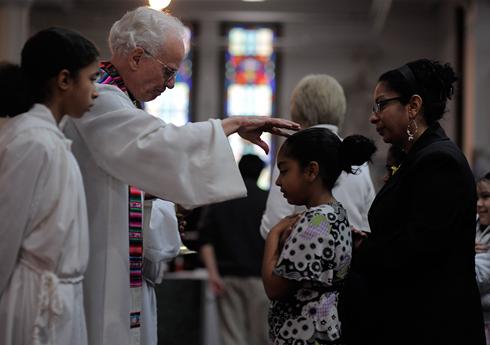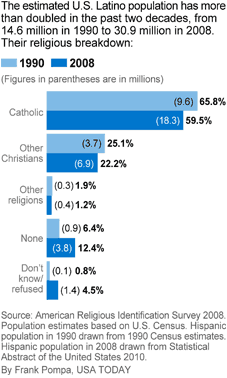 Latino population growth over the past two decades has boosted numbers in the Catholic Church, but a new, in-depth analysis shows Latinos’ allegiance to Catholicism is waning as some move toward other Christian denominations or claim no religion at all.
Latino population growth over the past two decades has boosted numbers in the Catholic Church, but a new, in-depth analysis shows Latinos’ allegiance to Catholicism is waning as some move toward other Christian denominations or claim no religion at all.A report out today by researchers at Trinity College in Hartford, Conn., finds Latino religious identification increasingly diverse and more “Americanized.”
The analysis, based on data from the 2008 American Religious Identification Survey, compares responses to phone surveys in 1990 and 2008 conducted in English and Spanish. The 2008 sample included 3,169 people who identified themselves as Latinos.
“What you see is growing diversity — away from Catholicism and splitting between those who join evangelical or Protestant groups or no religion,” says report co-author Barry Kosmin, a sociologist and director of the Institute for the Study of Secularism in Society and Culture at Trinity College. Among findings:
•From 1990 to 2008, the Catholic Church in the USA added an estimated 11 million adults, including 9 million Latinos. In 1990, Latinos made up 20% of the total Catholic population, but by 2008, it rose to 32%.
•Those who claimed “no religion” rose from fewer than 1 million (6% of U.S. Latinos) in 1990 to nearly 4 million (12% of Latinos) in 2008.
“As Latinos or any other ethnic group assimilates to American culture, they pick up the values of the broader American culture and are somewhat less likely to identify with the religious identification, or any other identification, that marked their parents or grandparents,” says Mary Gautier, a senior researcher at the Center for Applied Research in the Apostolate at Georgetown University.
 The new data send a clear message, says Allan Figueroa Deck, a Catholic priest and executive director of the Secretariat of Cultural Diversity in the Church, a program of the U.S. Conference of Catholic Bishops.
The new data send a clear message, says Allan Figueroa Deck, a Catholic priest and executive director of the Secretariat of Cultural Diversity in the Church, a program of the U.S. Conference of Catholic Bishops.
“The biggest challenge the Catholic Church faces is the movement of Latino people not to other religions but rather to a secular way of life in which religion is no longer very important,” he says. “We really need to ask ourselves why that is and what response the church can develop for this challenge.”
By Sharon Jayson, USA TODAY, March 16, 2010